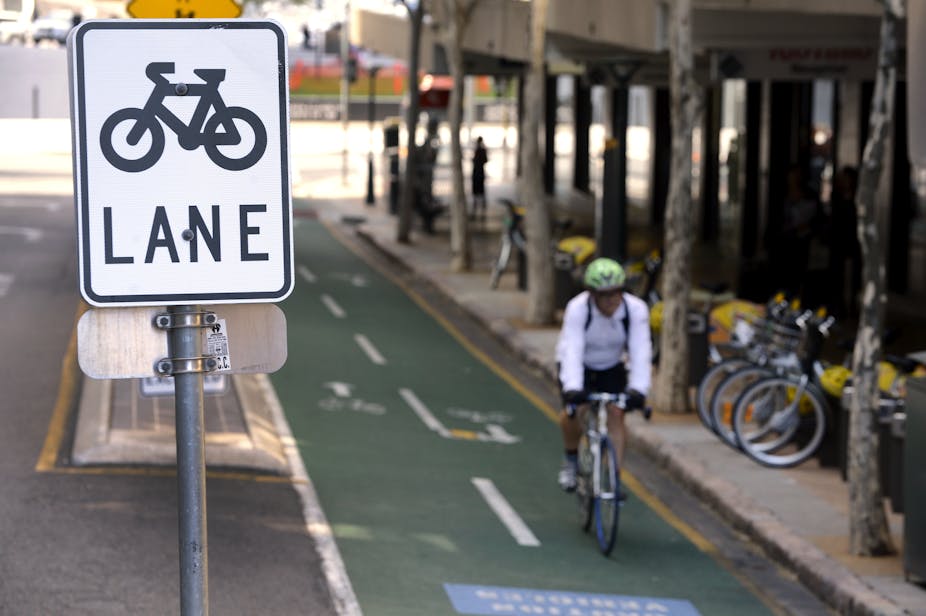For a few hours, late last week, it looked like Queensland could become the first Australian state to start relaxing its strict bicycle helmet laws.
After months of careful review of the evidence, a state parliamentary committee backed the need for A new direction for cycling in Queensland, releasing a 200-page report that recommended, among other things, letting cyclists over 16 ride helmet-free in certain conditions.
Yet within hours of that report being released, the state Transport Minister Scott Emerson called a press conference to reject relaxed bicycle helmet laws, in what I would argue was a clear example of personal views and politics trumping science and evidence.
While the minister will support many of the report’s 68 other recommendations, such as safe passing distance rules for motorists and increased penalties for breaking road rules, he declared that:
Personally I’m a big believer in the benefits of helmets and I believe the evidence shows helmets reduce the risk of serious injury.
That statement sums up well the confusion around this issue.
While on the one hand helmets can protect against some head injuries, particularly minor scrapes and contusions, making them compulsory at all times does not automatically reduce rates of serious injury at a population level.
Clashing heads over helmets
The evidence on the effectiveness of mandatory helmet legislation is highly contested, with many analyses reporting negative effects on cycling participation.
There is compelling evidence that cycling head injury rates were consistently declining before the introduction of helmet legislation (see figure 1, p4 of this report), with any reductions in head injuries attributed to the legislation actually due to a marked reduction in the number of people cycling.
After examining the evidence, the Queensland parliamentary committee summed this up well:
The report notes Australia is one of the few countries in the world that has compulsory helmet laws and the committee was not convinced there was sufficient worldwide evidence of the safety outcomes of compulsory helmet wearing to justify the mandating of helmet wearing for all cyclists.
In other words, the committee was not against encouraging helmet use; instead it was a recognition that, in some circumstances, a helmet may not always be required when cycling.
Making adult decisions
The committee’s recommendation (number 15) was to have a two-year trial, exempting cyclists aged 16 years and over from the mandatory helmet road rule when riding in parks, on footpaths and shared/cycle paths and on roads with a speed limit of 60 km/hr or less.
Those people who want to wear a helmet can certainly continue to do so. The focus on adults is important, as 50% of cycling injuries are among children.
Further, the conditions of the trial are those scenarios where the risk of a cycling crash, or the even less likely event of a head injury, is very, very low. In the conditions where the risk of cycling is high, such as road racing or mountain biking, helmets are still required.
An important aspect of this recommended trial was to evaluate it carefully, with baseline measurements and data collection on injury and cycling participation. This trial could have established the evidence, either for or against this helmet law reform, and finally lay to rest the debate over the value of helmet legislation.
What a sensible idea! We could have had real world evidence to inform policy, but instead we have seen one politician and his advisers who know better.
Is this another example of politicians being out of touch with the majority views of the public? Consider the views on increasing spending of taxpayers’ money on public transport in Sydney (supported by the public) versus investment in motorways (supported by the government).
On this issue, many local councils around the country, including Brisbane, Fremantle, and the lord mayors of Adelaide and Sydney have publicly expressed their support of reviews of helmet laws, seeing them as one barrier to increasing cycling participation.
The negative effect of helmet legislation on the bicycle share schemes in Brisbane and Melbourne has also been well-documented.
Queensland has missed a good opportunity to start bringing Australia back to parity with the rest of the world.
It is worth remembering that the Northern Territory already has legislation, which allows helmet-free cycling on footpaths and cyclepaths. They have one of the highest rates of cycling participation by women, and cycling mode share for journey to work in the country. Their cycling injury rates are no different to the rest of the country.
Despite this lack of political leadership on bicycle helmet law reform, if the other recommendations of the Queensland parliamentary committee are implemented, there should be significant improvements in cycling. These are to be applauded.
If the Queensland transport minister can’t be persuaded to change his mind, then perhaps it will be up to another state now to do what needs to be done to trial and evaluate what happens when you relax bicycle helmet laws.

